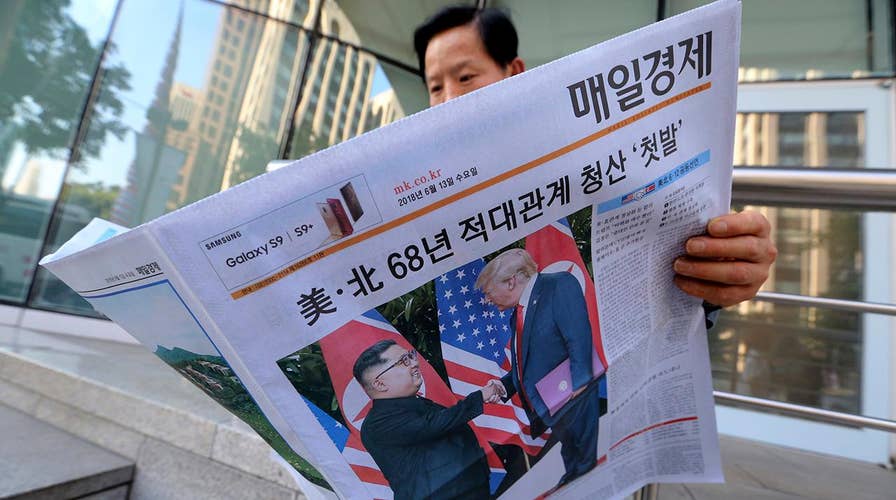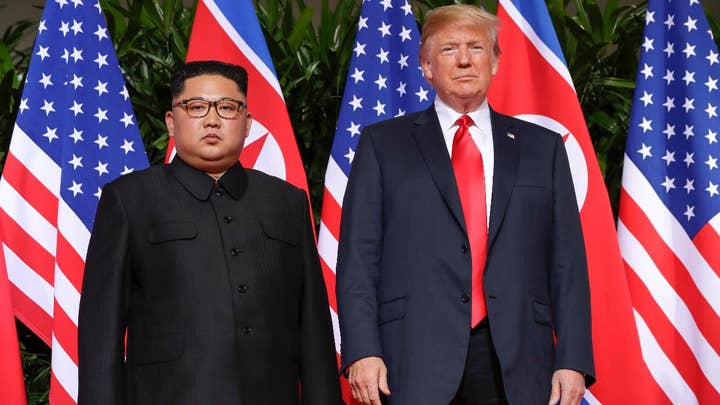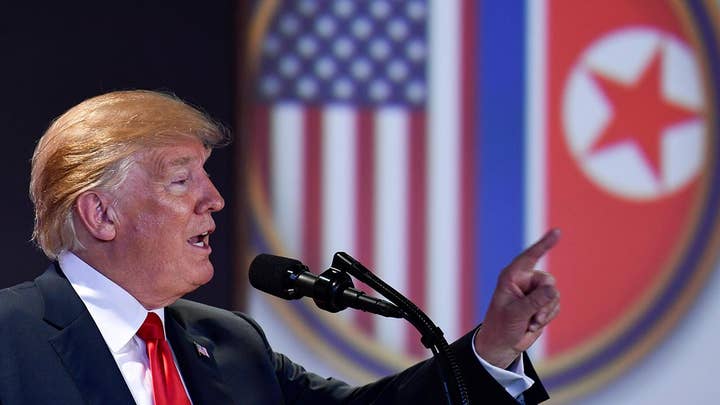South Korea reacts to historic Trump-Kim Jong Un meeting
Greg Palkot reports from Seoul on the reaction to denuclearization efforts and President Trump's bid to end joint military drills with the U.S.
President Trump, as part of the historic summit with North Korean leader Kim Jong Un, reversed longstanding U.S. policy by calling for an end to military drills on the Korean Peninsula and saying he wants to bring U.S. troops home from the region – the president’s latest convention-defying move on the international stage in less than a week.
"We will be stopping the war games, which will save us a tremendous amount of money unless and until we see the future negotiation is not going along like it should," Trump said after his meeting with Kim. "But we'll be saving a tremendous amount of money. Plus, I think it's very provocative."
He also said he wants to “bring our soldiers back home” from the region, though added this is not “part of the equation right now.”
TRUMP, KIM AGREE TO RECOVERING AND RETURNING US MILITARY REMAINS FROM KOREAN WAR
While both moves would align with Trump’s general principles of cutting costs and pulling soldiers back from conflicts where possible, they are sure to cause concern in Seoul, which views the presence of U.S. troops and the military exercises as important to regional security.
The South Korean government seemed to express nervousness about Trump’s remarks.
"At this current point, there is a need to discern the exact meaning and intent of President Trump's comments," Seoul's Defense Ministry said, according to the Associated Press, adding that there have been no discussions yet with Washington on modifying military drills set for August.
A spokesman for U.S. Forces Korea, which has approximately 30,000 troops in the peninsula, said they’ve received “no updated guidance” in regards to military exercises.
"The USFK has received no updated guidance on execution or cessation of training exercises -- to include this fall's scheduled Ulchi Freedom Guardian," the spokesman said in a statement.
U.S. officials told Fox News that the military will continue drills in Japan, where it has twice as many troops. Long-range bombers will continue training flights from Guam.
The upcoming joint exercise in August is more computer-based training. More controversial are the annual spring drills -- such drills were cancelled in the mid-1990's when other agreements were made with North Korea.
Thailand also hosts annual joint training with Asian allies including South Korea and the United States each year. Such exercises are larger than what the U.S. military does with South Korea.
Despite its apparent reservations about Trump's statement, the South Korean government has been encouraging of the summit and played a key role in it, with Foreign Minister Kang Kyung-wha delivering a congratulatory message for the “success” of the event to Secretary of State Mike Pompeo, according to Yonhap news agency.
Trump also spoke with South Korean President Moon Jae-in after the summit, while Pompeo is set to visit South Korea Wednesday.
The president’s comments about military exercises represent the latest example of his willingness to tear up the usual script for presidential pronouncements on the world stage.
Specifically, Trump labeling the drills as “provocative” is a contradiction of past U.S. statements that have declared the drills to be both routine and defensive.
At the summit itself, Trump adopted an unorthodox approach by showing Kim a video on an iPad about "two men, two leaders, one destiny." Similar to a movie trailer, the film shows images of warplanes while a narrator suggests "a new world can begin today, one of friendship, respect and goodwill."
The summit came just days after Trump took his wrecking-ball style of negotiation to the G-7 summit in Canada. There, he called for Russia’s re-admittance to the group, publicly sparred with leaders over his tariffs on aluminum and steel, and refused to sign a communique after attacking “meek and mild” Canadian Prime Minister Justin Trudeau for making “false statements” on tariffs.
An image of Trump in the negotiation with the group, arms folded and appearing nonplussed as an exasperated German Chancellor Angela Merkel made her point, did the rounds on social media from both Trump critics and supporters as a symbol of how Trump was upending the international order -- for better or for worse.
Critics accused Trump of needlessly alienating allies. His remarks Tuesday drew similar scrutiny from Democrats.
House Democratic leader Nancy Pelosi, D-Calif., on Tuesday, accused Trump of handing Kim concessions in exchange for vague promises of denuclearization.
“In his haste to reach an agreement, President Trump elevated North Korea to the level of the United States while preserving the regime’s status quo,” Pelosi said in a statement. “The millions of families currently living in fear of nuclear weapons in the region deserve strong and smart leadership built on diplomacy and engagement with our regional partners and allies.”
She also criticized his approach to diplomatic norms, particularly in the wake of the G-7 summit.
“The President’s marginalization of the vast expertise of the State Department and his habitual disparaging of our allies as demonstrated at the G7 Forum hinders a lasting, stable pathway to peace,” she said.
Trump has said explicitly, both on the campaign trail and in office, that he wants to get away from business-as-usual. Trump was elected on such an approach and certain aspects of his foreign agenda appear to be popular. A recent Fox News poll found 66 percent of Americans approve of his decision to meet Kim.
In Canada, Trump criticized past U.S. leaders for the status quo on North Korea and trade.
“I don't blame them, I blame our leaders,” he said. “In fact, I congratulate leaders of other leaders for so crazily being able to make those trade deals that were so good for their country and bad for the United States.”
On North Korea, he has repeatedly blasted prior administrations for allowing the situation in the peninsula to deteriorate. He told Fox News’ Sean Hannity that prior approaches had failed.
TRUMP TO 'HANNITY': KIM JONG UN TO START DENUCLEARIZATION 'VIRTUALLY IMMEDIATELY'
“You know, we did sanctions and all the things you would do but I think without the rhetoric, you know, other administrations, I don’t want to get specific on that, but you know they had a policy of silence,” he said.
Fox News’ Lucas Tomlinson, Greg Palkot, Serafin Gomez and The Associated Press contributed to this report.
























